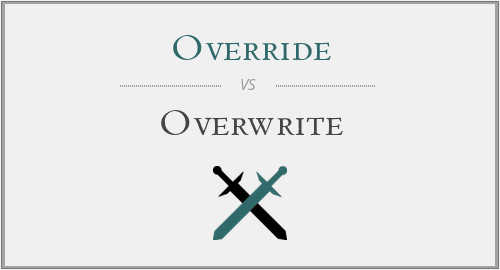Override
Override means to add to or enhance something apart from its existing behaviour. It is used very commonly in programming languages. For example, you have generic procedures and rules that all the employees of your company should follow, but you also want the HR team to follow additional procedures. So, the HR team will override the existing procedures and enhance them to add their specific procedures. But that doesn’t mean that the existing procedures are removed. Both will be there.
Same way, the slices of bread popup automatically when the toaster is done toasting them. But there is also a manual stop button which overrides the automatic functionality. As soon as you press stop, the slices of bread popup whether the toaster is done toasting or not.
Override can be used as a verb or noun. It means to cancel or reject a decision or view or interrupt action done by an automatic device manually. Examples:
• In case of any emergency, you can override the functioning of this device by using the stop button.
• Any objections can be overridden only by the court of law.
• You can override the permissions on the document only if you are an admin.
• Using the equipment without a manual override could be dangerous
Some synonyms of override are: overrule, nullify, cancel or quash.
Overwrite

Overwriting something is to completely remove the old version and then add a new version. The previous version is then lost. For example, if you have a shared copy of a document, and write some content, but someone else accesses it, writes their content and commits the changes, then your changes will be overwritten or lost. It is similar to replacing content with another and mostly used in computing and data contexts. Example,
• She overwrote the file by mistake. (Past tense of overwrite)
• We should give only read permissions for new users so that they don’t accidentally overwrite the content.
• See to it that the file is not overwritten when you commit the changes.
• The previous version is not up to the mark; you can overwrite everything.
• The boy was caught overwriting the important dialogues of the play.
In some contexts, overwrite also means writing too elaborately or with too many words. For example, “She overwrote the meaning of the poem; so, everyone got bored.”
So, we see that overriding is mostly adding to having the ability to change the existing functionality of something; however, overwriting replaces the existing functionality.
“While you try to override the content with your implementation, make sure you don’t overwrite it completely!”




Have a discussion about this article with the community:
Report Comment
We're doing our best to make sure our content is useful, accurate and safe.
If by any chance you spot an inappropriate comment while navigating through our website please use this form to let us know, and we'll take care of it shortly.
Attachment
You need to be logged in to favorite.
Log In